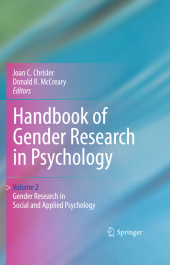 Neuerscheinungen 2016Stand: 2020-02-01 |
Schnellsuche
ISBN/Stichwort/Autor
|
Herderstraße 10
10625 Berlin
Tel.: 030 315 714 16
Fax 030 315 714 14
info@buchspektrum.de |

Joan C. Chrisler, Donald R. McCreary
(Beteiligte)
Handbook of Gender Research in Psychology
Volume 2: Gender Research in Social and Applied Psychology
Herausgegeben von Chrisler, Joan C.; McCreary, Donald R.
Softcover reprint of the original 1st ed. 2010. 2016. xxvi, 828 S. 2 Tabellen. 254 mm
Verlag/Jahr: SPRINGER, BERLIN; SPRINGER NEW YORK; SPRINGER 2016
ISBN: 1-493-93942-4 (1493939424)
Neue ISBN: 978-1-493-93942-8 (9781493939428)
Preis und Lieferzeit: Bitte klicken
The study of gender and gender roles has advanced significantly since the 1960s. This is particularly evident in social and applied psychology. This handbook focuses on these aspects of psychology, reviewing theories and findings from across the specialties.
Donald R. McCreary and Joan C. Chrisler The Development of Gender Studies in Psychology Studies of sex differences are as old as the ?eld of psychology, and they have been conducted in every sub?eld of the discipline. There are probably many reasons for the popularity of these studies, but three reasons seem to be most prominent. First, social psychological studies of person perception show that sex is especially salient in social groups. It is the ?rst thing people notice about others, and it is one of the things we remember best (Fiske, Haslam, & Fiske, 1991; Stangor, Lynch, Duan, & Glass, 1992). For example, people may not remember who uttered a witty remark, but they are likely to remember whether the quip came from a woman or a man. Second, many people hold ?rm beliefs that aspects of physiology suit men and women for particular social roles. Men´s greater upper body strength makes them better candidates for manual labor, and their greater height gives the impression that they would make good leaders (i. e. , people we look up to). Women´s reproductive capacity and the caretaking tasks (e. g. , breastfeeding, baby minding) that accompany it make them seem suitable for other roles that require gentleness and nurturance. Third, the logic that underlies hypothesis testing in the sciences is focused on difference. Researchers design their studies with the hope that they can reject the null hypothesis that experimental groups do not differ.
Volume II. Gender Research in Developmental, Social, and Applied Psychology. Introduction.- Section 9. Lifespan Development. Gender in Childhood. Gender in Adolescence. Gender in Adulthood.- Section 10. Personality Psychology. Gender and Personality. Gender Issues in Psychometric Testing of Personality and Abilities. Gender and Motivation for Power, Achievement, and Affiliation.- Section 11. Abnormal Psychology. Gender Stereotypes in Diagnostic Categories. Gender and Depression. Gender Identity Disorder. Gender and Body Image.- Section 12. Psychotherapy. Feminist Therapy. Psychotherapy with Men. Gender Stereotypes in Family Therapy and Couples Counseling. Issues in Therapy with GLBT Clients.- Section 13. Social Psychology. Gender Stereotypes in Popular Culture. Gender, Peer Relations, and Intimate Relationships. Gender, Aggression, and Altruism. Gender and Group Behavior. Sexism and Homophobia.- Section 14. Industrial-Organizational Psychology. Gender and Occupational Choice. Gender and the Division of Labor. Gender and Career Development. Gender and Leadership. Gender and Sexual Harassment, Bullying.- Section 15. Health Psychology. Gender and Health Behaviors. Gender, Stress, and Coping. Gender Issues in Health Care Utilization. Gender Issues in the Diagnosis and Treatment of Chronic Illnesses.- Section 16. Special Topics in Applied Psychology. Gender, Sport, and Exercise Psychology. Gender Issues in Forensic Psychology. Gender and Human Factors. Gender Issues in Community Psychology. Gender and Technology.


